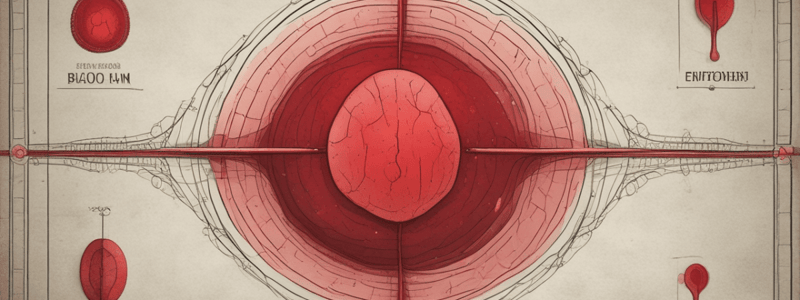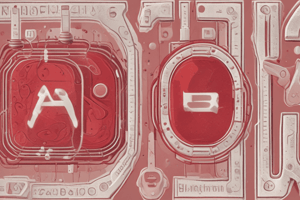Podcast
Questions and Answers
What is the main reason why blood type must be matched correctly during donations?
What is the main reason why blood type must be matched correctly during donations?
- To increase the chances of a successful transfusion
- To enhance the blood's oxygen-carrying capacity
- To ensure compatibility with the immune system (correct)
- To prevent clotting
What is unique about type O blood?
What is unique about type O blood?
- It can only be received by individuals with type O blood
- It has neither A nor B antigens, but can only be received by type AB individuals
- It can be donated to anyone (correct)
- It has both A and B antigens
Why can individuals with type AB blood receive blood from anyone?
Why can individuals with type AB blood receive blood from anyone?
- Because they lack A and B antigens
- Because their immune system is weaker
- Because they have both A and B antigens (correct)
- Because they are universal donors
What is the significance of the Rh factor protein on the surface of red blood cells?
What is the significance of the Rh factor protein on the surface of red blood cells?
What is blood type an example of in genetics?
What is blood type an example of in genetics?
Why can't a person with type B blood receive type A or AB blood?
Why can't a person with type B blood receive type A or AB blood?
What is the reason behind the immune system's attack on red blood cells with unfamiliar proteins during blood transfusions?
What is the reason behind the immune system's attack on red blood cells with unfamiliar proteins during blood transfusions?
What are the three components of blood that have proteins on their surface?
What are the three components of blood that have proteins on their surface?
What is the difference between type A and type B blood in terms of the antigens present on the surface of red blood cells?
What is the difference between type A and type B blood in terms of the antigens present on the surface of red blood cells?
Why is it possible for individuals with type O blood to donate to anyone?
Why is it possible for individuals with type O blood to donate to anyone?
What determines the four main blood types, A, B, AB, and O?
What determines the four main blood types, A, B, AB, and O?
What is the result of an individual with type B blood receiving type A or AB blood?
What is the result of an individual with type B blood receiving type A or AB blood?
Why can individuals with type AB blood receive blood from anyone, regardless of their blood type?
Why can individuals with type AB blood receive blood from anyone, regardless of their blood type?
What is the significance of blood type in terms of genetic inheritance?
What is the significance of blood type in terms of genetic inheritance?
What is the relationship between antigens and blood type?
What is the relationship between antigens and blood type?
Why is it important to consider blood type during medical procedures, such as transfusions?
Why is it important to consider blood type during medical procedures, such as transfusions?
Flashcards are hidden until you start studying
Study Notes
- Blood type is a phenotype that cannot be determined by physical appearance, unlike other phenotypes such as eye color, hair texture, and height.
- Blood is composed of platelets, plasma, and red blood cells, and each has proteins on its surface.
- The immune system is very protective and will attack red blood cells with proteins it is not used to, which is why blood type must be matched correctly during donations.
- There are four main blood types: A, B, AB, and O, which are determined by the presence or absence of specific antigens on the surface of red blood cells.
- Type A blood has A antigens, type B blood has B antigens, type AB blood has both A and B antigens, and type O blood has neither A nor B antigens.
- A person with type B blood can accept type B blood but not type A or AB blood, as their immune system will attack the unfamiliar antigens.
- Type O blood can be donated to anyone, but individuals with type O blood can only receive blood from other type O individuals.
- Individuals with type AB blood can receive blood from anyone, as they have both A and B antigens and can recognize all types.
- Blood types also have a plus or minus sign indicating the presence or absence of the Rh factor protein on the surface of red blood cells.
- Blood type is genetically inherited and is a great example of multiple alleles, with alleles being different forms of a gene.
- A couple with type A blood can have a baby with type O blood if they are both heterozygous for the A allele, but a baby with type B blood is not possible.
- Punnett squares can be used to determine the possible genotypes and phenotypes of offspring in blood type inheritance problems.
Studying That Suits You
Use AI to generate personalized quizzes and flashcards to suit your learning preferences.



